Intro
Discover Myalgic Encephalomyelitis (ME) Fatigue Syndrome symptoms, including chronic exhaustion, brain fog, and muscle pain, and learn about diagnosis, treatment, and management of this debilitating condition.
Myalgic Encephalomyelitis (ME), also known as Chronic Fatigue Syndrome (CFS), is a complex and chronic illness characterized by persistent and profound fatigue that is not alleviated by rest. The symptoms of ME/CFS can vary from person to person, but they often include a combination of physical, cognitive, and emotional manifestations. Understanding the symptoms of ME/CFS is crucial for diagnosis, treatment, and management of the condition.
The onset of ME/CFS can be sudden or gradual, and it may be triggered by a viral infection, immune system dysfunction, or other factors. People with ME/CFS often experience a range of symptoms, including fatigue, muscle pain, joint pain, headaches, and sleep disturbances. The fatigue associated with ME/CFS is not just a feeling of being tired; it is a profound exhaustion that can interfere with daily activities, social relationships, and overall quality of life.
ME/CFS is a multifaceted condition that affects not only the physical health but also the mental and emotional well-being of individuals. The symptoms can be debilitating, and they may fluctuate over time, making it challenging to diagnose and manage the condition. Despite the challenges, research and awareness about ME/CFS are increasing, and there are various strategies and treatments that can help alleviate the symptoms and improve the quality of life for people with ME/CFS.
Understanding ME/CFS Symptoms
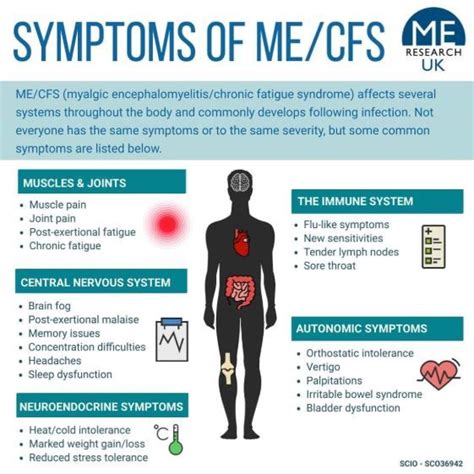
The symptoms of ME/CFS can be categorized into several key areas, including fatigue, pain, sleep disturbances, cognitive difficulties, and emotional changes. Fatigue is the most common and debilitating symptom of ME/CFS, and it can be described as a feeling of exhaustion, lethargy, or lack of energy. The fatigue can be exacerbated by physical or mental activity, and it may be accompanied by other symptoms such as muscle pain, joint pain, and headaches.
Types of Fatigue
There are different types of fatigue associated with ME/CFS, including: * Physical fatigue: characterized by muscle weakness, lack of energy, and decreased endurance * Mental fatigue: characterized by difficulty concentrating, memory problems, and decreased cognitive function * Emotional fatigue: characterized by mood changes, irritability, and decreased emotional well-beingME/CFS Diagnosis and Treatment
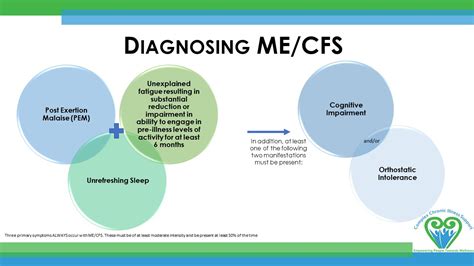
Diagnosing ME/CFS can be challenging due to the complexity and variability of the symptoms. There is no single test or biomarker that can definitively diagnose ME/CFS, and diagnosis is often based on a combination of clinical evaluation, medical history, and laboratory tests. The Institute of Medicine (IOM) has established diagnostic criteria for ME/CFS, which include:
- A substantial reduction or impairment in the ability to engage in pre-illness activities
- Persistent or recurrent fatigue that is not alleviated by rest
- At least one of the following symptoms: muscle pain, joint pain, headaches, sleep disturbances, or cognitive difficulties
Treatment for ME/CFS is often focused on managing the symptoms and improving quality of life. This may include a combination of medications, lifestyle modifications, and alternative therapies such as:
- Pain management: medications or therapies to alleviate pain and discomfort
- Sleep management: strategies to improve sleep quality and duration
- Cognitive therapy: techniques to improve cognitive function and manage cognitive difficulties
- Lifestyle modifications: changes to diet, exercise, and daily activities to manage symptoms and improve overall health
Managing ME/CFS Symptoms
Managing ME/CFS symptoms requires a comprehensive and individualized approach. This may involve: * Keeping a symptom journal to track symptoms and identify patterns * Developing a daily routine that includes rest, relaxation, and activities that bring joy and fulfillment * Practicing stress-reducing techniques such as meditation, yoga, or deep breathing exercises * Building a support network of family, friends, and healthcare professionalsME/CFS and Mental Health
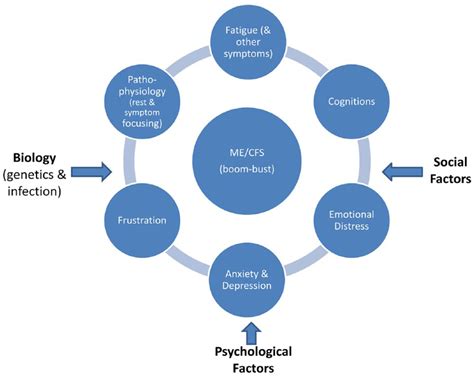
ME/CFS can have a significant impact on mental health, and people with ME/CFS are at increased risk of developing anxiety, depression, and other mental health conditions. The chronic nature of ME/CFS, combined with the unpredictability of the symptoms, can lead to feelings of frustration, hopelessness, and despair.
It is essential to address mental health concerns in people with ME/CFS, and this may involve:
- Counseling or therapy to manage stress, anxiety, and depression
- Support groups to connect with others who have ME/CFS
- Mindfulness and relaxation techniques to reduce stress and improve mood
- Medications or supplements to manage symptoms of anxiety and depression
Cognitive Difficulties in ME/CFS
Cognitive difficulties are common in ME/CFS, and they can include problems with: * Memory: difficulty remembering words, events, or tasks * Attention: difficulty focusing, concentrating, or paying attention * Processing speed: slowed processing speed, which can affect reaction time and decision-making * Executive function: difficulty with planning, organization, and decision-makingME/CFS and Sleep
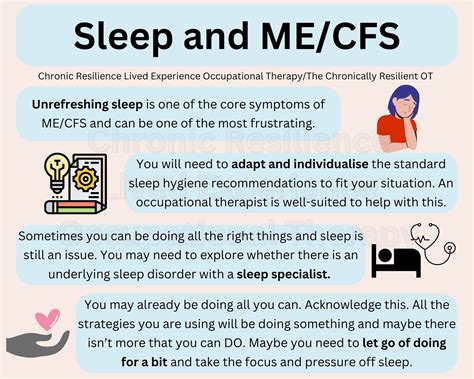
Sleep disturbances are common in ME/CFS, and they can include:
- Insomnia: difficulty falling asleep or staying asleep
- Sleep apnea: pauses in breathing during sleep
- Restless leg syndrome: uncomfortable sensations in the legs during sleep
- Sleep stage abnormalities: altered sleep patterns, including reduced deep sleep and REM sleep
Improving sleep quality is essential for managing ME/CFS symptoms, and this may involve:
- Establishing a consistent sleep schedule
- Creating a sleep-conducive environment
- Avoiding caffeine, nicotine, and electronics before bedtime
- Practicing relaxation techniques, such as deep breathing or meditation, to reduce stress and promote relaxation
ME/CFS and Pain
Pain is a common symptom of ME/CFS, and it can include: * Muscle pain: pain or tenderness in the muscles * Joint pain: pain or stiffness in the joints * Headaches: frequent or severe headaches * Abdominal pain: pain or discomfort in the abdomenManaging pain in ME/CFS may involve:
- Medications: over-the-counter or prescription medications to alleviate pain
- Alternative therapies: acupuncture, massage, or physical therapy to reduce pain and improve function
- Lifestyle modifications: changes to diet, exercise, and daily activities to manage symptoms and improve overall health
ME/CFS and Exercise
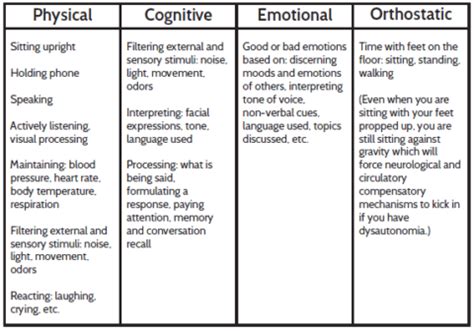
Exercise is an essential component of overall health, but it can be challenging for people with ME/CFS. Overexertion can exacerbate symptoms, while underexertion can lead to deconditioning and decreased function.
It is essential to find a balance between rest and activity, and this may involve:
- Graded exercise therapy: a gradual and supervised increase in exercise intensity and duration
- Pacing: breaking activities into smaller, manageable chunks to avoid overexertion
- Rest: allowing time for rest and recovery between activities
- Stretching and flexibility exercises: gentle exercises to improve flexibility and reduce stiffness
ME/CFS and Nutrition
Nutrition plays a critical role in managing ME/CFS symptoms, and a balanced diet can help alleviate fatigue, improve energy, and support overall health.Some key nutritional considerations for ME/CFS include:
- Eating a balanced diet: focusing on whole, unprocessed foods, including fruits, vegetables, whole grains, lean proteins, and healthy fats
- Avoiding trigger foods: identifying and avoiding foods that trigger or worsen symptoms
- Staying hydrated: drinking plenty of water and limiting sugary or caffeinated beverages
- Considering supplements: certain supplements, such as vitamin B12 or iron, may be beneficial for people with ME/CFS, but it is essential to consult with a healthcare professional before adding any supplements to your diet
ME/CFS and Lifestyle Modifications
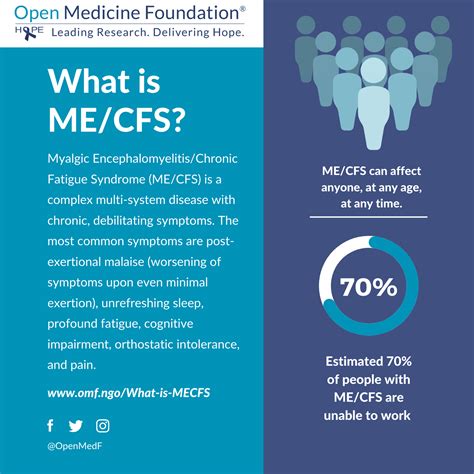
Lifestyle modifications can play a significant role in managing ME/CFS symptoms and improving overall quality of life.
Some key lifestyle modifications for ME/CFS include:
- Prioritizing rest and relaxation: allowing time for rest and recovery, and engaging in activities that promote relaxation and reduce stress
- Managing stress: using stress-reducing techniques, such as meditation or deep breathing, to manage stress and anxiety
- Building a support network: connecting with family, friends, and healthcare professionals to build a support network and reduce feelings of isolation
- Engaging in activities that bring joy and fulfillment: participating in activities that bring pleasure and fulfillment, and help to manage symptoms and improve overall well-being
ME/CFS and Work
ME/CFS can have a significant impact on work and daily activities, and it is essential to find ways to manage symptoms and maintain productivity.Some key considerations for work and ME/CFS include:
- Disclosing ME/CFS to employers: informing employers about ME/CFS and working together to find accommodations and modifications that can help manage symptoms
- Modifying work activities: adjusting work activities to avoid exacerbating symptoms, and taking regular breaks to rest and recover
- Prioritizing self-care: engaging in self-care activities, such as exercise, meditation, or spending time in nature, to manage stress and reduce symptoms
- Considering disability benefits: if ME/CFS is severe and debilitating, it may be necessary to consider disability benefits or other forms of support
ME/CFS and Relationships

ME/CFS can have a significant impact on relationships, and it is essential to find ways to maintain connections and build support networks.
Some key considerations for relationships and ME/CFS include:
- Communicating with loved ones: informing family and friends about ME/CFS, and working together to find ways to manage symptoms and maintain relationships
- Building a support network: connecting with other people who have ME/CFS, and building a support network of healthcare professionals, family, and friends
- Prioritizing self-care: engaging in self-care activities, such as exercise, meditation, or spending time in nature, to manage stress and reduce symptoms
- Seeking counseling or therapy: considering counseling or therapy to address emotional and relationship challenges associated with ME/CFS
ME/CFS and Emotional Well-being
ME/CFS can have a significant impact on emotional well-being, and it is essential to find ways to manage stress, anxiety, and depression.Some key considerations for emotional well-being and ME/CFS include:
- Practicing stress-reducing techniques: using techniques, such as meditation or deep breathing, to manage stress and anxiety
- Engaging in activities that bring joy and fulfillment: participating in activities that bring pleasure and fulfillment, and help to manage symptoms and improve overall well-being
- Building a support network: connecting with family, friends, and healthcare professionals to build a support network and reduce feelings of isolation
- Seeking counseling or therapy: considering counseling or therapy to address emotional and relationship challenges associated with ME/CFS
Conclusion and Next Steps

ME/CFS is a complex and chronic illness that requires a comprehensive and individualized approach to management. By understanding the symptoms, diagnosis, and treatment options, people with ME/CFS can work with their healthcare providers to develop a personalized plan to manage symptoms and improve overall quality of life.
If you or someone you know is living with ME/CFS, it is essential to seek support and guidance from healthcare professionals, support groups, and online resources. By working together, we can raise awareness, promote education, and improve the lives of people affected by ME/CFS.
We invite you to share your thoughts, experiences, and questions about ME/CFS in the comments below. Your input can help us better understand the condition and provide more effective support and resources for those affected.
What are the primary symptoms of ME/CFS?
+The primary symptoms of ME/CFS include profound fatigue, muscle pain, joint pain, headaches, and sleep disturbances. These symptoms can vary in severity and impact daily activities, social relationships, and overall quality of life.
How is ME/CFS diagnosed?
+ME/CFS is diagnosed based on a combination of clinical evaluation, medical history, and laboratory tests. The Institute of Medicine (IOM) has established diagnostic criteria for ME/CFS, which include a substantial reduction or impairment in the ability to engage in pre-illness activities, persistent or recurrent fatigue, and at least one of the following symptoms: muscle pain, joint pain, headaches, sleep disturbances, or cognitive difficulties.
What are the treatment options for ME/CFS?
+Treatment options for ME/CFS include medications, lifestyle modifications, and alternative therapies. Medications may be prescribed to alleviate pain, improve sleep, or manage cognitive difficulties. Lifestyle modifications, such as pacing, rest, and stress management, can help manage symptoms and improve overall health. Alternative therapies, such as acupuncture, massage, or cognitive therapy, may also be beneficial in managing ME/CFS symptoms.
